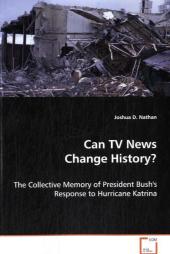 Neuerscheinungen 2011Stand: 2020-01-07 |
Schnellsuche
ISBN/Stichwort/Autor
|
Herderstraße 10
10625 Berlin
Tel.: 030 315 714 16
Fax 030 315 714 14
info@buchspektrum.de |

Joshua D. Nathan
Can TV News Change History?
The Collective Memory of President Bush´s Response to Hurricane Katrina
2011. 92 p. 220 mm
Verlag/Jahr: VDM VERLAG DR. MÜLLER 2011
ISBN: 3-639-06522-0 (3639065220)
Neue ISBN: 978-3-639-06522-0 (9783639065220)
Preis und Lieferzeit: Bitte klicken
In an age when technology is evolving at an
exponential pace, our reliance on it is increasing
just as fast. But during, and immediately after,
Hurricane Katrina, almost all communication in the
area abruptly ceased. Only one medium was able to
effectively operate and inform the nation: TV News.
Very little academic literature exists on the
ramifications from a period in which one news medium
dominates. Serving as a foundational citation in
Communication, the analysis uses a methodology that
may continue to be replicated in order to forge a
more definitive and diversified view of how TV News
impacts history. Did reporters deceive the millions
who were watching? Appealing to professionals working
in History, Politics, and Communication, this book
investigates the broadcast content to determine its
accuracy and the public memory it created. It sheds
light on what really happened during the aftermath of
Hurricane Katrina and whether President Bush
responded appropriately. Evaluating the industry´´s
impact during a rare time when it faced no
competition, this book is also directed at anyone
considering a career in TV News and those already
working within the field.
Joshua D. Nathan, MA: Graduating Magna Cum Laude in Journalismfrom Northwestern University, he earned a Certificate ofBroadcast Meteorology while working on-air in TV News&focusedon Communication for his MA. Associate Faculty at theMetropolitan State College of Denver, Instructor at the ArtInstitute of Colorado,&a Freelance Journalist.
In an age when technology is evolving at anexponential pace, our reliance on it is increasingjust as fast. But during, and immediately after,Hurricane Katrina, almost all communication in thearea abruptly ceased. Only one medium was able toeffectively operate and inform the nation: TV News.Very little academic literature exists on theramifications from a period in which one news mediumdominates. Serving as a foundational citation inCommunication, the analysis uses a methodology thatmay continue to be replicated in order to forge amore definitive and diversified view of how TV Newsimpacts history. Did reporters deceive the millionswho were watching? Appealing to professionals workingin History, Politics, and Communication, thisbookinvestigates the broadcast content to determine itsaccuracy and the public memory it created. It shedslight on what really happened during the aftermath ofHurricane Katrina and whether President Bushresponded appropriately. Evaluating the industry´simpact during a rare time when it faced nocompetition, this book is also directed at anyoneconsidering a career in TV News and those alreadyworking within the field.


